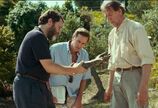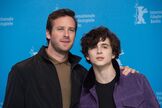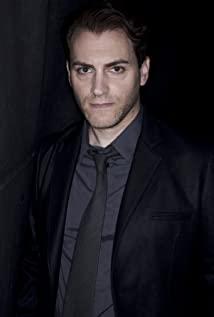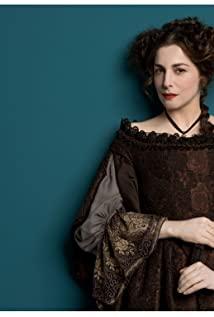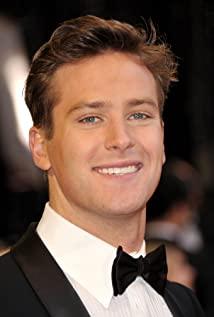I really liked the film as a whole. The bright sunny days and lush woods of Italian summer in the film made me think of Bazier's works, especially "Summer Landscape" and "Fisherman with a Fishing Net" , it seems that the love of a beautiful boy should take place in such a sunny scene. At first, I hoped that the film could be pulled from the beginning to the end, but later I found that I prefer the development process of the protagonist's love affair from scratch in the first hour of the film. After the first confession part and the mother as the main line of the emotional support of the two were written, this movie is the end of the film for me.
confession play
After my mother read "Seven Days Talk", Elio and Oliver opened their hearts to each other for the first time. This confession scene was a group. The two began to test each other when they were in the square, and then there was the famous scene. The grass kissing scene is over. I'll start with the first shot in this set.
by the pool. Elio and Oliver are discussing whether to confess? The shot starts with one leg in the pool, and Elio's voice off the screen. He is telling Oliver the love story of the princess and the knight in "Seven Days Talk". This scene lasts for 10 seconds, so this is Elio legs? After the camera cuts, we see the lonely and melancholy back of Oliver riding by the pool, not Elio's legs. When Oliver asked Elio if the knight confessed to the princess, the camera switched to a picture with two people in the frame at the same time. Oliver was in the virtual focus in the front right of the screen, and Elio was in the real focus in the upper left of the middle of the screen. OK, now I understand that Oliver is actually asking Elio will you confess to me? The story is just a pretense, the camera is fixed, Elio doesn't directly answer yes or no, then the screen zooms, Oliver's face starts to focus, he frowns, his head slightly to the left and asks: Did the princess ask? Oliver was still frowning while waiting for Elio to answer. When Elio said no, Oliver finally raised his brows and said something that I also think so. Oliver is actually telling Elio you don't tell me so we can continue to have fun together and play in town, Oliver likes Elio but he doesn't know what he should do if things continue to develop, it's better to keep the status quo.
Next was the second time the two of them rode their bikes to town together. From the time they picked up the car together, it could be seen that the two of them were much more familiar than the last time they went to town together. Oliver complained to Elio when they picked up the car together. I was injured while riding a bike before, and the camera was very wasteful to the process of picking up the car and pushing it out for two people. It's worth noting that this time Oliver rode in front and Elio followed.
The square confession scene, I personally prefer this scene, because it is a relatively complete long shot. In this scene, the director miraculously used audio-visual language to visualize Elio's heart again to the audience. We can see While Elio told Oliver his heart, he kept OS in his heart.
The long shot starts from the two people riding their bikes to the square and ends on their bikes leaving. The camera moves from right to left as the two ride their bikes, Oliver gets out of the car and walks into the roadside shop to buy cigarettes, the music starts playing, and Elio's inner activity begins when Oliver leaves himself alone (I don't know him What are you thinking), Oliver walked from the store to Elio, and when Oliver asked Elio if he was smoking, the music was heard, the music was so short that I had to think it was Elio's inner activity, while guessing that it must be Related to Oliver. The first time after the music stopped we could hear the cacophony of the town, the high heels of pedestrians on the side of the road, the sound of two people walking with a cart, and then the roar of a car, which I personally tend to interpret as yes Elio's inner activity is represented by the background sound in the real scene instead of the music sound.
The camera moves in the direction of the duo towards the plaza sculpture, always on Elio's side. The two stood in front of the sculptural fence, the smoking topic was over, and the next topic was about World War I. We could see how knowledgeable Elio was, and Oliver was as surprised as I was. When Oliver corrected his father last time in the study, Elio didn't say a word. At this time, he corrected Oliver without hesitation and said that it was World War I, not World War II, and even something that one needs to be over 80 years old to understand, but Elio said it like a lot.
Elio walked to the right side of the fence, and two people stood far away, standing on both sides of the sculpture fence. Elio, however, replied that he knew nothing, especially the important things. Oliver asked what was the matter and Elio said you know, and Oliver started to move forward after asking. Oliver asks why he is telling himself this? This sentence is not just a question, but an answer. Oliver knows what the important thing Elio said, and is curious why Elio told himself this? Oliver asks why I need to know and then move forward, Elio repeats because I want you to know. Oliver keeps moving forward until the painting is drawn. Elio starts to walk forward while talking to himself. When Elio starts to walk, the music is played here. When Oliver disappears, Elio's inner drama will appear, so how to distinguish Elio When does inner activity end? The camera pans upwards to show the sculpture of the two people talking to. On the one hand, I understand the title that they both started to use. When the camera pans down, the two people walk to the other side of the fence and enter the painting together. On the other hand, I remind the audience that just now The stages of musical ups and downs are the fluctuations in Elio's inner world. Sure enough, when Elio spoke, the music stopped. Another thing to note is that when he and the two were walking at the same time, the blue bus moved from the upper left corner to the right. If you watch the whole film, you should be able to guess that this is the place where they traveled afterward. by bus. After the two were drawn together again, Oliver confirmed to Elio whether we were thinking about the same thing, and this group of tentative conversations was over.
Sure enough, Oliver left Elio's side and the music sounded again, the camera panned up again, Elio drew, and when the camera panned down, Oliver just appeared, and then walked towards Elio, Oliver's voice was the reason for the end of the music, and he spoke again. Oliver looked very upset. After hearing Elio's confession to himself, Oliver, who was overwhelmed, told Elio that this matter could not be discussed.
The two were about to ride their bikes to leave the square. As a spectator, I was mentally prepared to think that Oliver was not going to go with Elio this time. After seeing the warning, Elio biked away on his own. Only then did Oliver ask to go with him. This long shot of more than four minutes, every time I watch it, it feels like a century has passed. In the second of this scene, the director made full use of the space near the statue fence in the square and combined the audio-visual language to shoot the first interaction between the two. The kind of uneasy mentality of exploring my heart has to convince me.
A scene on the way home by bike. The three scenes of watching the two of them ride a long distance are accompanied by the sound of music. The scene of riding home this time is completely different from the short ending last time. The director expressed a lot of ink on the way the two went home. role. There is also thirst and begging for water. The two people after expressing their intentions are in a good mood. I have to say that as an audience, I am very happy watching it. I hope the protagonist will continue to sprinkle sugar. I haven't read the original novel, and I wonder if the book contains a lot of descriptions of Elio's mental activities on the way home.
Before the grass kiss scene, they went home and passed the second place shown in the movie. Elio said that this pond is only his own place. He read countless books here and knew countless things. Coming from this place, however, he thought none of that was as important as Oliver, who knew nothing about him. My own understanding is that Elio brought him here to introduce himself to Oliver. This play in the pond, I think, also paved the way for the next two people to kiss on the grass.
Oliver splashed water on his face and stretched his back muscles to show a happy acceptance of Elio, and his words also showed that he liked Elio but had a hard time deciding. Elio of course jumped on Oliver's back happily after hearing that. The next kiss on the grass couldn't be more natural. The two began to test from the pool and lie down on the grass together for so long. If nothing happened, I would be really sorry for the audience.
Oliver disappeared for a while after the grass kiss, and Elio, who had been unable to find his lover, was squatting sadly in the dimly lit courtyard. This long shot of about two minutes is the second in the film with deep blue tones. The scene, when the camera gives a close-up of Elio's frontal body, a mirror image floating like a lake and the blurred face of Elio are intertwined in front of the screen, I can't see how sad this face is, but through sadness The music and the deep, melancholy blue hue of Elio can understand Elio's inner sadness. This movie is mostly presented from Elio's perspective, and the audience can see a relatively complete image of Elio's inner world, but Oliver, who is also the protagonist, cannot be ignored, after all, he is the source of Elio's emotional ups and downs. My personal guess is that after Oliver got Elio's clear intentions, he disappeared for a while due to inner struggles and moral pressures, not knowing how to balance the dilemma of wanting to be with his lover wantonly and thinking that he couldn't be together for a while.
When Oliver came back again, the relationship between the two broke through the most difficult barrier and developed rapidly. Let's not talk about the social pressure of same-sex love in this era.
mother line
The first time the mother appeared was to greet Oliver. She could see that Oliver was very tired at a glance. Then there was a long shot. The mother stood at the door of the first floor and explained that Elio, who had just come downstairs, took Oliver's luggage into the room. , the mother's two sentences explain the next development of the story. From here, the audience can understand why Elio had to pack his closet before, because he had to give up his room to Oliver to live in. The official encounter of the protagonists in the film begins precisely because of the introduction of the mother, not the father, mind you.
Mother's second appearance was in the early morning of the second day after Oliver's arrival. Mother was the last of the four to go to the table. After entering the table, she moved the juice on the table. Every time her mother appeared, she would bring out the film. important imagery?, can we speculate about the mother's role as a link between the two male protagonists.
When the study was talking about ?, it was the mother who came into the room with the ? juice. After the mother gave Oliver a glass of juice, she reminded Elio to drink the juice. Although Oliver and his father talked about the etymology of ?, it should be noted that this time Only the two male protagonists drink juice in the play.
The dinner scene, first of all, is the mother preparing tableware at the table in the yard. It seems to be very casual and short-lived. The appearance of the mother is not a waste. The mother brings out Oliver's character in the way of questioning, "Oliver came back for dinner. ?" Elio said he didn't know, but the cook said that Oliver looked like a movie star. At this time, Elio was not very happy after being touched by Oliver on his back. After shaving and changing his clothes, Elio complained to Oliver with his mother at the dining table. In the end, because his mother told Oliver that he would not come back to finish the meal, Elio was even more upset. .
If you observe carefully, the director moved the camera to illustrate the attitude of the family of three towards Oliver at the table full of people. The father always kept the posture of pouring wine. The camera did not directly give a close-up of the front of the father when he spoke the first two times. Instead, when Elio talks to his mother, the camera cuts to the front of the father and mother, Elio is in front of the left side of the screen, and the three people form a relationship shot. Only when Elio is speaking, the camera gives a close-up, and at the same time, the guests in the foreground cover the father's figure, only showing the father's head in the distance, avoiding the close-up of the father's upper body. When did the close-up of the father's body and the voice finally appear together? When my mother asked if we should endure Oliver for six weeks, my father responded. This is also his last dialogue in this scene. The father's first sentence was in response to his wife. When he said the second sentence, the picture changed. Gave it to Elio, father said "you'll love him". This is very interesting. Although Oliver is not in the picture, there is no shortage of topics about him. His father also said that Elio would like Oliver, which is very interesting. I watched it several times before and didn't understand why the male guest was shot at the table, but this time I finally realized that it was for foreground occlusion.
In the second breakfast scene, there was only talk at the table about whether Elio had sex with his girlfriend last night. His mother was not in the picture. When Oliver told Elio to try again, the picture suddenly jumped to give a lower angle. The panoramic view of the courtyard, we can see the mother was pruning the plants in the yard, she asked "what to try"? (Mother only said one sentence in this scene to bring out the next plot.) However, the father replied that the three of them were going to a town to see the newly excavated cultural relics, but did not answer the matter discussed by the three. What happened next should be clear to the viewers who have seen it. The two of them reconciled by the sea. (By the way, I was curious about what kind of plant my mother was cutting, and later walked up to Oliver and handed it to him.)
Reading play on a rainy day. My mother read a story in the German "Seven Days" in which the knight asked the princess if I should confess to you or die. The sound of mother's reading was accompanied by the faint sound of rain and the slight muffled sound of the piano. The three people in the dimly-toned room cuddled together on the sofa and thought about the knight together. When Elio replied that he must not dare to confess, his father encouraged him, it was too obvious but Elio was the knight. Sure enough, in the next scene, the two male protagonists began to confess to each other.
Oliver disappeared after the two grass kisses, and Elio was nowhere to be found. After Elio asked his mother where he went, the mother told her son that the person you like also likes you. Mother, the god of assists, is online again. This time, without the image symbol, it is pointed out that this is the theme of a love movie.
After learning that Oliver was going to leave, the mother asked his father Elio what to do, and suggested that the two of them travel together. Mother really doesn't have a word of nonsense in this drama. The dinner table scene before Oliver was about to leave, his mother didn't say a word, and the juice on the table was gone.
The movie clearly shows the mother witnessing the emotional development between the male protagonists from beginning to end. After Elio and Oliver separated, the mother drove back to the sad son without asking a word, because she knew it from beginning to end. Emotional development of son and lover. Although the soul conversation between my father and Elio after Elio's breakup is the highlight of this film, I personally prefer my mother as an extremely important driving line in the film. It can even be said that if there is no mother, I don't know what the two protagonists should be. How to develop a relationship.
Film is the restoration of material reality. The real complexity and real feeling presented by the film exist. A good film director is using the technology of film to present his cognition of the world. As an audience, I should know more about it. How this technology explores the world and how it expands cognition.
View more about Call Me by Your Name reviews




